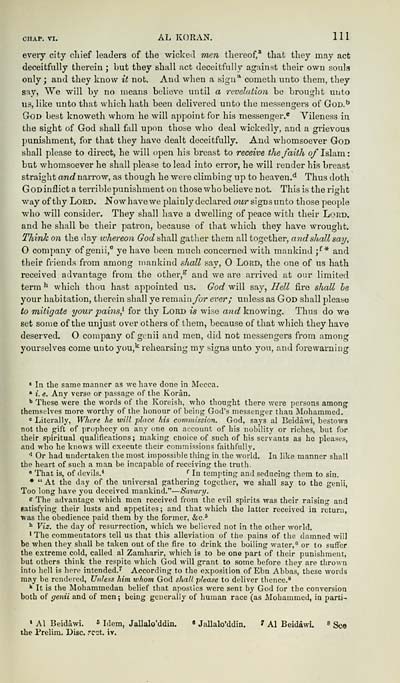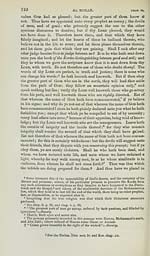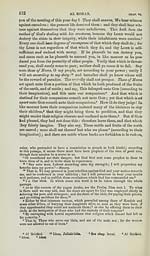Download files
Complete book:
Individual page:
Thumbnail gallery: Grid view | List view

CHAP. VI. AL KORAN. 1 1 1
eveiy city chief leaders of the wicked men thereof," that they may act
deceitfully therein ; but they shall net deceitfully against their own souls
only ; and they know it not. And when a sign" cometh unto them, they
s:\y, We will by no means believe until a revelation be brought unto
us, like nnto that which hath been delivered unto the messengers of God.''
God best knoweth whom he will appoint for his messenger.' Vileness in
the sight of God shall fall upon those who deal wickedly, and a grievous
punishment, for that they have dealt deceitfully. And whomsoever God
shall please to direct, he will open his breast to receive the faith o/ Islam:
but whomsoever he shall please to lead into error, he will render his breast
straight and narrow, as though he were climbing up to heaven.'* Thus doth
God inflict a terrible punishment on those who believe not. This is the right
way of thy Lord. Now have we plainly declared our signsunto those people
who will consider. They shall have a dwelling of peace with their Lord,
and he shall be their patron, because of that which they have wrought.
Think on the day ivhereon God shall gather them all together, mid shall say,
O comi)any of genii,® ye have been much concerned with mankind ;''* and
their friends from among mankind shall say, O Lord, the one of us hath
received advantage from the other,^ and we are arrived at our limited
term ^ which thou hast appointed us. God will say, Hell fire shall be
your habitation, therein shall ye remain/or ever; unless as God shall please
to mitigate your pahis,^ for thy Lord is wise and knowing. Thus do we
set some of the unjust over others of them, because of that which they have
deserved. O company of genii and men, did not messengers from among
yourselves come unto you,^ rehearsing my signs unto you, and forewarning
' In the same manner as we have done in Mecca.
• i. e. Any verse or passage of the Koran.
*> These were the words of the Koreish, who thought there were persons among
themselves more worthy of the honour of being God's messenger than Mohammed.
" Literally, Wiere he will place his commission. God, says al Beidawi, bestows
not the gift of prophecy on any one on account of his nobility or riches, but for
iheir spiritual qualifications ; making cnoice o-f such of his servants as he pleases,
and who he knows will execute their commissions faithfully.
■1 Or had undertaken the most impossible thing in the world. In like manner shall
the heart of such a man be incapable of receiving the truth.
• That is, of devils.* f In tempting and seducing them to sin.
* " At the day of the universal gathering together, we shall say to the genii.
Too long have you deceived mankind." — Savary.
e The advantage which men received from the evil spirits was their raising and
satisfying their lusts and appetites ; and that which the latter received la return,
was the obedience paid them by the former, &c.*
^ Viz. the day of resurrection, which we believed not in the other world.
' The commentators tell us that this alleviation of the pains of the damned will
be when they shall be taken out of the fire to drink the boiling water," or to suffer
the extreme cold, called al Zamharir, which is to be one part of their punishment,
but others think the respite which God will grant to some before they are thrown
into hell is here intended.'' According to the exposition of Ebn Abbas, these words
may be rendered. Unless him whom God shall please to deliver thence.*
^ It is the Mohammedan belief that apostles were sent by God for the conversion
both of genii and of men ; being generally of human race (as Mohammed, in parti-
* Al Beidawi. ^ I Jem, Jallalo'ddin. ' Jallalo'ddin. ' Al Beidawi. « g^^
the Prelim. Disc. rcct. iv.
eveiy city chief leaders of the wicked men thereof," that they may act
deceitfully therein ; but they shall net deceitfully against their own souls
only ; and they know it not. And when a sign" cometh unto them, they
s:\y, We will by no means believe until a revelation be brought unto
us, like nnto that which hath been delivered unto the messengers of God.''
God best knoweth whom he will appoint for his messenger.' Vileness in
the sight of God shall fall upon those who deal wickedly, and a grievous
punishment, for that they have dealt deceitfully. And whomsoever God
shall please to direct, he will open his breast to receive the faith o/ Islam:
but whomsoever he shall please to lead into error, he will render his breast
straight and narrow, as though he were climbing up to heaven.'* Thus doth
God inflict a terrible punishment on those who believe not. This is the right
way of thy Lord. Now have we plainly declared our signsunto those people
who will consider. They shall have a dwelling of peace with their Lord,
and he shall be their patron, because of that which they have wrought.
Think on the day ivhereon God shall gather them all together, mid shall say,
O comi)any of genii,® ye have been much concerned with mankind ;''* and
their friends from among mankind shall say, O Lord, the one of us hath
received advantage from the other,^ and we are arrived at our limited
term ^ which thou hast appointed us. God will say, Hell fire shall be
your habitation, therein shall ye remain/or ever; unless as God shall please
to mitigate your pahis,^ for thy Lord is wise and knowing. Thus do we
set some of the unjust over others of them, because of that which they have
deserved. O company of genii and men, did not messengers from among
yourselves come unto you,^ rehearsing my signs unto you, and forewarning
' In the same manner as we have done in Mecca.
• i. e. Any verse or passage of the Koran.
*> These were the words of the Koreish, who thought there were persons among
themselves more worthy of the honour of being God's messenger than Mohammed.
" Literally, Wiere he will place his commission. God, says al Beidawi, bestows
not the gift of prophecy on any one on account of his nobility or riches, but for
iheir spiritual qualifications ; making cnoice o-f such of his servants as he pleases,
and who he knows will execute their commissions faithfully.
■1 Or had undertaken the most impossible thing in the world. In like manner shall
the heart of such a man be incapable of receiving the truth.
• That is, of devils.* f In tempting and seducing them to sin.
* " At the day of the universal gathering together, we shall say to the genii.
Too long have you deceived mankind." — Savary.
e The advantage which men received from the evil spirits was their raising and
satisfying their lusts and appetites ; and that which the latter received la return,
was the obedience paid them by the former, &c.*
^ Viz. the day of resurrection, which we believed not in the other world.
' The commentators tell us that this alleviation of the pains of the damned will
be when they shall be taken out of the fire to drink the boiling water," or to suffer
the extreme cold, called al Zamharir, which is to be one part of their punishment,
but others think the respite which God will grant to some before they are thrown
into hell is here intended.'' According to the exposition of Ebn Abbas, these words
may be rendered. Unless him whom God shall please to deliver thence.*
^ It is the Mohammedan belief that apostles were sent by God for the conversion
both of genii and of men ; being generally of human race (as Mohammed, in parti-
* Al Beidawi. ^ I Jem, Jallalo'ddin. ' Jallalo'ddin. ' Al Beidawi. « g^^
the Prelim. Disc. rcct. iv.
Set display mode to: Large image | Transcription
Images and transcriptions on this page, including medium image downloads, may be used under the Creative Commons Attribution 4.0 International Licence unless otherwise stated. ![]()
| Early Gaelic Book Collections > J. F. Campbell Collection > Koran: or, Alcoran of Mohammed > (265) |
|---|
| Permanent URL | https://digital.nls.uk/77137010 |
|---|
| Description | Volumes from a collection of 610 books rich in Highland folklore, Ossianic literature and other Celtic subjects. Many of the books annotated by John Francis Campbell of Islay, who assembled the collection. |
|---|
| Description | Selected items from five 'Special and Named Printed Collections'. Includes books in Gaelic and other Celtic languages, works about the Gaels, their languages, literature, culture and history. |
|---|

